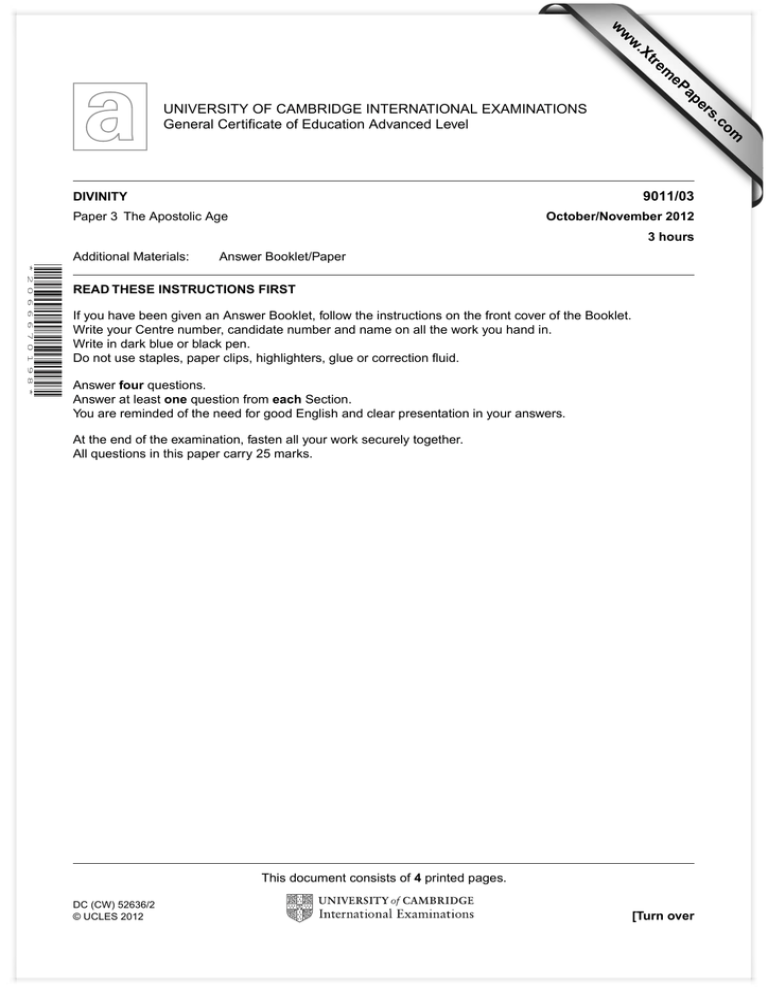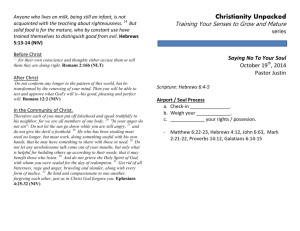
w
w
ap
eP
m
e
tr
.X
w
om
.c
s
er
UNIVERSITY OF CAMBRIDGE INTERNATIONAL EXAMINATIONS
General Certificate of Education Advanced Level
9011/03
DIVINITY
Paper 3 The Apostolic Age
October/November 2012
3 hours
Additional Materials:
Answer Booklet/Paper
* 2 0 6 6 6 7 0 1 9 8 *
READ THESE INSTRUCTIONS FIRST
If you have been given an Answer Booklet, follow the instructions on the front cover of the Booklet.
Write your Centre number, candidate number and name on all the work you hand in.
Write in dark blue or black pen.
Do not use staples, paper clips, highlighters, glue or correction fluid.
Answer four questions.
Answer at least one question from each Section.
You are reminded of the need for good English and clear presentation in your answers.
At the end of the examination, fasten all your work securely together.
All questions in this paper carry 25 marks.
This document consists of 4 printed pages.
DC (CW) 52636/2
© UCLES 2012
[Turn over
2
Section A
Answer at least one question from this section.
If you choose Question 1, answer in one version only.
Colossians and Hebrews
REVISED STANDARD VERSION
1
Comment on points of interest or difficulty in four of the following, with brief reference to the
general context:
(a) Paul, an apostle of Christ Jesus by the will of God, and Timothy our brother,
To the saints and faithful brethren in Christ at Colossae:
Grace to you and peace from God our Father.
(Colossians 1:1–2)
(b) These are the only men of the circumcision among my fellow workers for the kingdom of God,
and they have been a comfort to me. Epaphras, who is one of yourselves, a servant of Christ
Jesus, greets you, always remembering you earnestly in his prayers…
(Colossians 4:11b–12a)
(c) Therefore, holy brethren, who share in a heavenly call, consider Jesus, the apostle and high
priest of our confession.
(Hebrews 3:1)
(d) Here tithes are received by mortal men; there, by one of whom it is testified that he lives. One
might even say that Levi himself, who receives tithes, paid tithes through Abraham…
(Hebrews 7:8–9)
(e) Nor was it to offer himself repeatedly, as the high priest enters the Holy Place yearly with
blood not his own…
(Hebrews 9:25)
(f)
And all these, though well attested by their faith, did not receive what was promised, since
God had foreseen something better for us, that apart from us they should not be made perfect.
(Hebrews 11:39–40)
© UCLES 2012
9011/03/O/N/12
3
NEW INTERNATIONAL VERSION
1
Comment on points of interest or difficulty in four of the following, with brief reference to the
general context:
(a) Paul, an apostle of Christ Jesus by the will of God, and Timothy our brother,
To the holy and faithful brothers in Christ at Colosse:
Grace and peace to you from God our Father.
(Colossians 1:1–2)
(b) These are the only Jews among my fellow-workers for the kingdom of God, and they have
proved a comfort to me. Epaphras, who is one of you and a servant of Christ Jesus, sends
greetings. He is always wrestling in prayer for you…
(Colossians 4:11b–12a)
(c) Therefore, holy brothers, who share in the heavenly calling, fix your thoughts on Jesus, the
apostle and high priest whom we confess.
(Hebrews 3:1)
(d) In the one case, the tenth is collected by men who die; but in the other case, by him who is
declared to be living. One might even say that Levi, who collects the tenth, paid the tenth
through Abraham…
(Hebrews 7:8–9)
(e) Nor did he enter heaven to offer himself again and again, the way the high priest enters the
Most Holy Place every year with blood that is not his own.
(Hebrews 9:25)
(f)
These were all commended for their faith, yet none of them received what had been promised.
God had planned something better for us so that only together with us would they be made
perfect.
(Hebrews 11:39–40)
2
How far can it be argued that Colossians and Hebrews were written to resolve similar problems
and issues affecting the lives of those to whom they were addressed?
3
How is the universal and cosmic significance of the work of Christ presented in Colossians and
Hebrews?
4
Give a critical assessment of the use of the Old Testament by the author of Hebrews.
© UCLES 2012
9011/03/O/N/12
[Turn over
4
Section B
Answer at least one question from this section.
5
What may be learnt from the structure and content of Acts concerning the author’s distinctive
interests and purpose?
6
Compare the roles and importance of Peter and Paul in the development of the ministry and
mission of the early church.
7
‘For he will render to every man according to his works: to those who by patience in well-doing
seek for glory and honour and immortality, he will give eternal life.’
(RSV, Romans 2:6–7)
‘God “will give to each person according to what he has done.” To those who by persistence in
doing good seek glory, honour and immortality, he will give eternal life.’
(NIV, Romans 2:6–7)
How far does this statement by Paul in Romans conflict with his teaching on justification by faith
elsewhere in this letter?
8
Examine Paul’s teaching on the gifts and fruit of the Holy Spirit in 1 Corinthians and Galatians.
9
‘There are strong grounds for believing that in its original form the Letter of James was not a
Christian document.’ Discuss.
10 Assess the roles and importance of the churches in Jerusalem and Antioch (in Syria) in the
development of the early church’s ministry and mission.
Copyright Acknowledgements:
Scripture quotations marked (RSV) are from the Revised Standard Version of the Bible, copyright © 1946, 1952 and 1971 by the Division of Christian Education
of the National Council of the Churches of Christ in the USA. Used by permission. All rights reserved.
Scripture quotations marked (NIV) are taken from the Holy Bible, New International Version®. NIV®. Copyright © 1973, 1978, 1984 by International Bible Society.
Used by permission. All rights reserved.
Permission to reproduce items where third-party owned material protected by copyright is included has been sought and cleared where possible. Every reasonable
effort has been made by the publisher (UCLES) to trace copyright holders, but if any items requiring clearance have unwittingly been included, the publisher will
be pleased to make amends at the earliest possible opportunity.
University of Cambridge International Examinations is part of the Cambridge Assessment Group. Cambridge Assessment is the brand name of University of
Cambridge Local Examinations Syndicate (UCLES), which is itself a department of the University of Cambridge.
© UCLES 2012
9011/03/O/N/12









